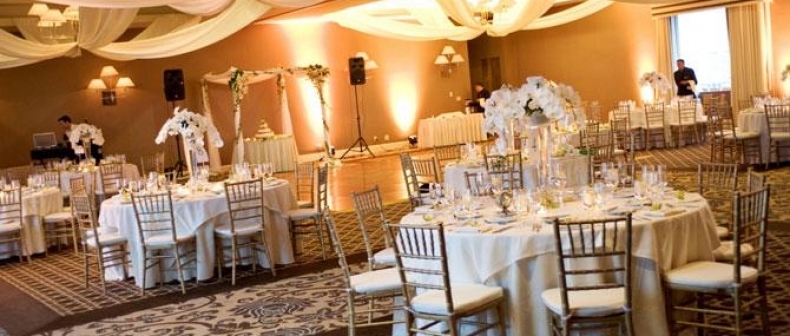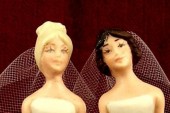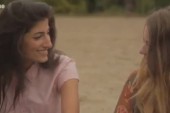
Yesterday I wrote about my friends Taryn and Margo and their considerations when styling their wedding. But weddings are as individual as the couples that plan them. Even though Margo provided the introduction to Lisa, whom she met through the 519 Community Centre, the two couples couldn’t be more different.
I met Lisa and her wife Tessa at their apartment building near the Church and Wellesley Village. Lisa, who has an open face and short dreadlocks, is from Jamaica. Tessa originally hails from St. Lucia but has been in Canada for most of her adult life. She has a shaved head and dresses in a masculine manner. They met when Tessa visited Jamaica in 2008. (They preferred that I use only their first names.)
“I thought she was very young,” Lisa said. “So most of the time, I sort of ignored her, really. But then she asked me out. And I think that was it.”
“The rest is history,” Tessa added, in a futile attempt to summarize the story. “I fell in love and we’re here.”
“You fell in love first, pretty much,” corrected Lisa. “I was still cautious because I felt she was on vacation. I said, ‘I’m not a tourist attraction. Go away!’ But she didn’t. And she kept coming back! She wouldn’t leave me alone. For quite some time, for a year, she kept coming to Jamaica every other month.”
I ask Lisa what the queer community is like in Jamaica.
“Underground. It’s an incredibly homophobic place. It’s a very religious community. And where there isn’t religion, there’s ignorance. It’s stunning. People die. A lot.”
The couple didn’t want to continue if they lived in separate countries.
“Tessa coming to live in Jamaica would be unthinkable. It would be a step back for her.”
“I asked her to come live here, because we could live here openly gay,” said Tessa. Back home, Lisa was a queer activist, a position in which her safety was at risk. Although they considered getting married to get her here, Lisa successfully applied for refugee status.
“Marriage for me is huge,” she said. “I didn’t think I should arrive today and get married tomorrow so we could solve all our immigration problems.”
“I didn’t in the beginning think about marriage,” said Tessa. “I wanted to be with her, she wanted to be with me, but I would have been fine without being married.”
“So did Lisa propose?” I asked.
“Me? No.”
“No, Lisa is very girly.”
“Very femme.”
“Lisa is very into ‘you have to woo me’…”
Lisa explained how the lesbian culture of Jamaica is based on a butch-femme dichotomy. She described how butch lesbians, who wear dresses for work throughout the week, will change into their suits in the backs of cars on their way to private, word-of-mouth parties. The biggest goal for a butch lesbian is to be self-employed. For their part, femme lesbians embrace all the trappings of traditional femininity.
“I come from a place where if I go on a date with you, I will stand at the door until you open it,” Lisa said.
“It’s part of her community,” Tessa interjected.
“If you ask me out, you’re paying.”
“And I grew up where you split the bill.”
“If you ask me to split the bill we’re never going out again.”
Needless to say, Tessa proposed.
“I think you took your time making it your decision,” Lisa said to Tessa. “I was grateful for that. It had to be your decision. But she was proper. She went down on one knee.”
“What was the vision for the wedding like?” I asked.
“Well, you’re speaking to me when you say that,” Lisa answered. “Because she did nothing.”
“I paid,” said Tessa.
“She paid. And I planned.”
“Butch-femme roles are pretty important to you?” I asked.
“I don’t know if it’s important. It’s just who we are,” explained Tessa. “Butches are quote unquote more masculine, perceived to be anyway. In basic terms, somebody who wears pants. And femme is somebody’s who’s more into makeup, more submissive. But Lisa is not a submissive personality…”
“In Jamaica, none of the butches cook or clean,” Lisa said. “Now, I clean and I cook. I’m good at it. Tessa’s good at cooking too, but she’s fairly lazy. But you couldn’t get me to the washing machine, so she does all the laundry. We just do the things we like to do.”
Naturally, the couple’s roles within their relationship were reflected in their wedding outfits.
“I wore a corset because I wanted to look very shapely,” Lisa said. “I’m a big girl and I thought a corset would help.” She found her ideal corset on the Starkers Corsetry website. “The first time I put it on I thought I looked fabulous, but I was so uncomfortable. I couldn’t sit, and I definitely couldn’t eat, so I changed my dress. So I wore a corset and a long skirt. It was two separate pieces, with a bolero to cover all the back fat.”
Halfway through the night, she changed into a simpler, more comfortable lace dress, and replaced her fascinator with orchids. She grew her dreadlocks long so could wear flowers in her hair. Her hands were covered with traditional henna designs, a gift from her friend El-Farouk, who also performed the ceremony.
“It’s supposed to be for good luck and good health,” she said. “It took three freaking hours to do.”
“I wore a suit,” Tessa said. “I stopped wearing dresses ever since I was eight or nine. I liked climbing trees, and pants made for better playing around. I’ve always worn pants. It was a wedding, so you get dressed up. It was an excuse to get a nice suit.” Tessa went to Trend Tailors and commissioned a custom suit. She explained in the Caribbean going to a tailor is more affordable than buying off the rack. “Next time you go to Jamaica, buy ten suits and you’ll have fabulous clothes.”
I asked if the tailor reacted uncomfortably to making a suit for a woman.
“No, absolutely not,” Tessa answered. “If you’re paying three grand for a suit, they just want your money.”
“I never found any weirdness anywhere,” Lisa added.
“I think what it is when you’re planning a wedding you’re dealing with a lot of people who are artists,” said Tessa. “It’s more about their craft. They’re just happy to make something special.”
“I felt like we handled everything we great confidence,” said Lisa. “Some of the venues we went to I think people might have been taken aback, but because we went in with such confidence, they never dared.”
“Did you think about yourself as setting an example with how you dressed for your wedding?”
“No,” Lisa answered. “I don’t set examples. That’s precisely why I don’t have children. It’s an important day for me. And it’s not about anyone else but me and Tess.”
“No, I wasn’t thinking about anybody when I chose what I wanted to wear. If I did think about people, it was that they’d think I looked fabulous in my suit. I wasn’t thinking like, ‘Oh, she’s wearing a suit, she might think she’s a guy!’ I know I’m a lesbian. I’m not trans, I have no desire to trans. I’m a lesbian and I’m happy with that. But I like nice suits. I wanted to look presentable, and that was it.”
Endearingly, the couple didn’t show each other what they were wearing until the ceremony. After a year of planning, the wedding was held at the 519 Community Centre last October. Lisa’s 87-year old mom, who flew in from Jamaica, walked her down the aisle.
“I spoiled some of the pictures because when I got to the door and my mother said ‘I’m so proud of you,’ I started to cry. And I cried most of the ceremony.”
“Did anything go wrong?” I asked.
“I didn’t think anything went wrong…” Tessa began.
“Two things went wrong for me,” Lisa said, cutting to the chase. “They didn’t flip the room fast enough for me. A pet peeve of mine is to have a dirty plate in front of me. They took too long to collect the plates. That kind of pissed me off.” Tessa shook her hand, protesting that only it was only Lisa who cared. “And then right after the ceremony, I got sick. I was allergic to the glue for my eyelashes.” They left for their Greek honeymoon the next day, by which point Lisa’s eyes had swelled so much she needed an injection from the cruise ship’s doctor. The couple missed the first island on their itinerary.
“For our anniversary,” Tessa said. “She owes me Mykonos.”
Regrettably, Lisa and Tessa requested that I not use photographs from their wedding in this post, but they showed me the album in person. Their big night looked as fun and inclusive as the couple are themselves. Tessa noted how often she was photographed smiling.
“That’s the one thing that went wrong,” Tessa said. “I didn’t cry. She felt I should have.”
“Yes,” Lisa concurred. “You should have.”
Lesbians and gay men have an interesting relationship to wedding ceremonies. Getting married is a tradition many of us didn’t think we’d be part of. That will change with the next generation who’ve never known a time when Canada didn’t allow same-sex marriage. The push for equal marriage is controversial even within the queer community, with some people feeling that custom marriages have historically oppressed women. Taryn and Margo acknowledged these feelings in their interview.
“I find it hard to see gay people not supporting gay marriage, but I understand it,” said Taryn. “Why would you be involved with something that’s been so patriarchal? But as long as you don’t make gay marriage trump all other human rights issues, it’s a step in the right direction.”
“And an advantage of being queer is that it lets you think, Why do we really want to get married?” Margo said. “Because it wasn’t just a natural step. It’s not expected that we’ll get married as much as it is for straight people. There’s no pressure from family and friends…except for grandchildren now.”
But that distance allows lesbian couples the opportunity to embrace or reject traditions ancient and modern, local and international. Couples can even decide which specifically lesbian conventions they want to continue–Lisa and Tessa embraced the butch-femme legacy that Taryn and Margo sought distance from. Ultimately, gay or straight, butch or femme, getting married forces a couple to confront who they are and the nature of their love.
“This was our day,” Lisa said in conclusion. “Anyone who didn’t like it–tough!”
____
Max Mosher writes about style for Toronto Standard. You can follow him on Twitter at @max_mosher_.
For more, follow us on Twitter @TorontoStandard or subscribe to our newsletter.














